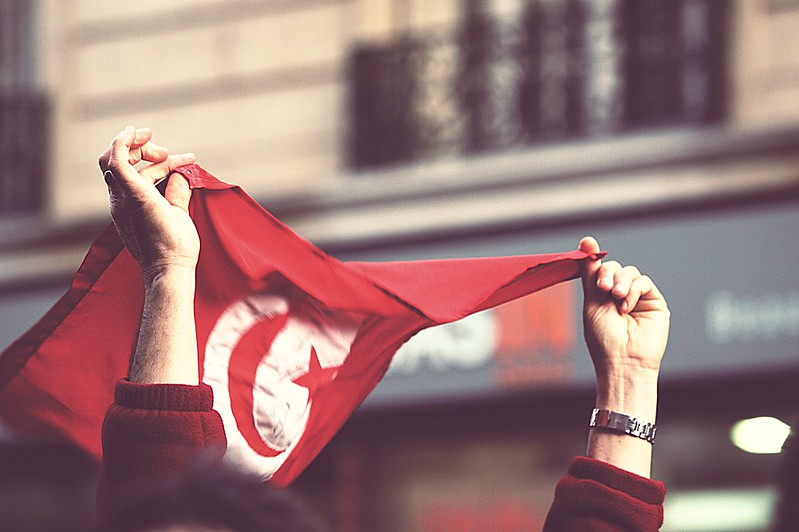
Last month, Transparency International released its 26th annual Corruption Perceptions Index – the leading indicator of public sector corruption across the globe. Building on the report’s findings, International Republican Institute (IRI) expert Rima Kawas illuminates the corruption at the heart of protests sweeping the Middle East and North Africa (MENA). Beginning with the Arab Spring and ongoing today, protestors across the region continue to take to the streets in masses – demanding the creation of governments that listen to their people.
Though each country is different, protests from Iraq, Algeria and Lebanon to Egypt and Tunisia have the same driving force: corruption. Extending far beyond petty bribes, the region is plagued with deep, systemic corruption that distorts high-level decision-making and prohibits the provision of basic services. It is the same kind of corruption that impacts the lives of everyday citizens. Take for example Iraq, where approximately $65 billion in oil exports are generated, but clean water is scarce for residents in the region of Basra where oil is abundant. Or Lebanon, where “nearly one in two people…is offered bribes in exchange for their votes, while more than one in four receives threats if they don’t vote a certain way,” according to Transparency International. And in Tunisia, according to a recent IRI poll, corruption has had a negative impact on 78 percent of citizens. Nearly one in four Tunisians have personally experienced corruption with police, and 74 percent claim personal relationships are important to “getting things done” with the government.
What’s more, for the third consecutive year, the MENA countries ranked an average of 39 out of 100 in the 2020 Transparency International Corruption Perception Index – proving that improved transparency and accountability in the region is critical. To offer insights into these rankings and the protests they’ve spurred, below are country-specific glimpses into the spark that started these protests.
- In Iraq, the protests that began in 2019 with the opaque dismissal of national hero and former head of Iraq’s counter-terror force Abdul-Wahab Al-Saadi released years of pent-up anti-establishment energy. The protests continue with a focus on unemployment, poor public services and corruption.
- In Lebanon, a tax on WhatsApp usage became the tipping point that drove people to the streets in demand of a complete government turnover. The public’s response symbolizes the government’s protracted mismanagement and incompetence, further highlighted by the country’s economic collapse and the August 4, 2020 port explosion.
- For Algeria, President Abdelaziz Bouteflika’s announcement that he was running for a 5th term ignited national protests demanding the withdrawal of his candidacy and an overhaul of the regime.
- Protestors in Egypt were demanding the resignation of President Abdel Fattah el-Sisi, and continue to fight for human rights and economic improvements.
- In Libya, protests focused on the deterioration of public services and corruption.
- Across Tunisia, protests recently erupted around the 10th anniversary of the Jasmine Revolution, highlighting the country’s poor economic conditions and the perceived erosion of civil liberties.
While systemic corruption continues to drive instability, the economic fallout of COVID-19 will only exacerbate it – potentially turning today’s wave of unrest into a tsunami. Given the region’s lack of transparency, it is difficult to determine if the funding allocated to address the pandemic will be used to help the average citizen. And even more money is coming, such as assistance from the International Monetary Fund (IMF). This influx of resources to address COVID-19 – coupled with governments’ resistance to change and foster public oversight – will likely make corruption worse and intensify discontent.
Already, COVID-19 is exposing the public service weaknesses that corruption begets. In some cases, fragile infrastructure such as healthcare systems are deteriorating, after years of political elite funneling public funds into their own pockets. As funding grows and corruption like this continues, these citizens will only become more emboldened to demand change.
One measure governments can take to avoid prolonged unrest is to create more transparent procurement practices for COVID-19 funding. To achieve this, civil society should continue their demands for better financial regulation and provide public awareness campaigns to keep citizens informed on the adequacy of their government’s COVID-19 response. To support public awareness, COVID-19 websites can also be established, such as the one that IRI helped with in North Macedonia, to provide information on COVID-19 spending and ensure funds are allocated effectively.
With corruption being a constant issue across the region, the current wave of the protests will continue to ebb and flow until governments take seriously the calls of the public to address the systemic corruption that is hindering prosperity for individuals.
Top